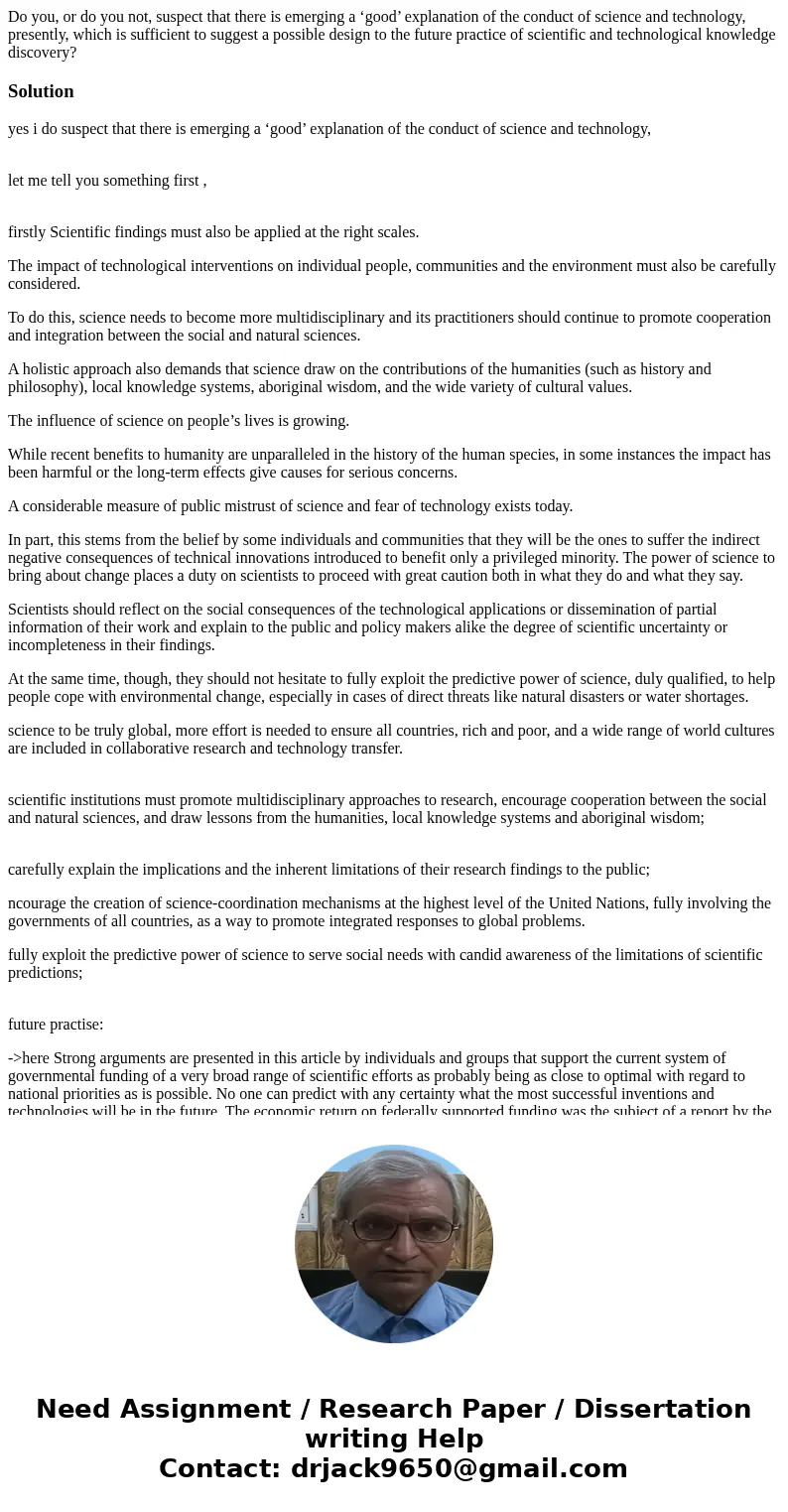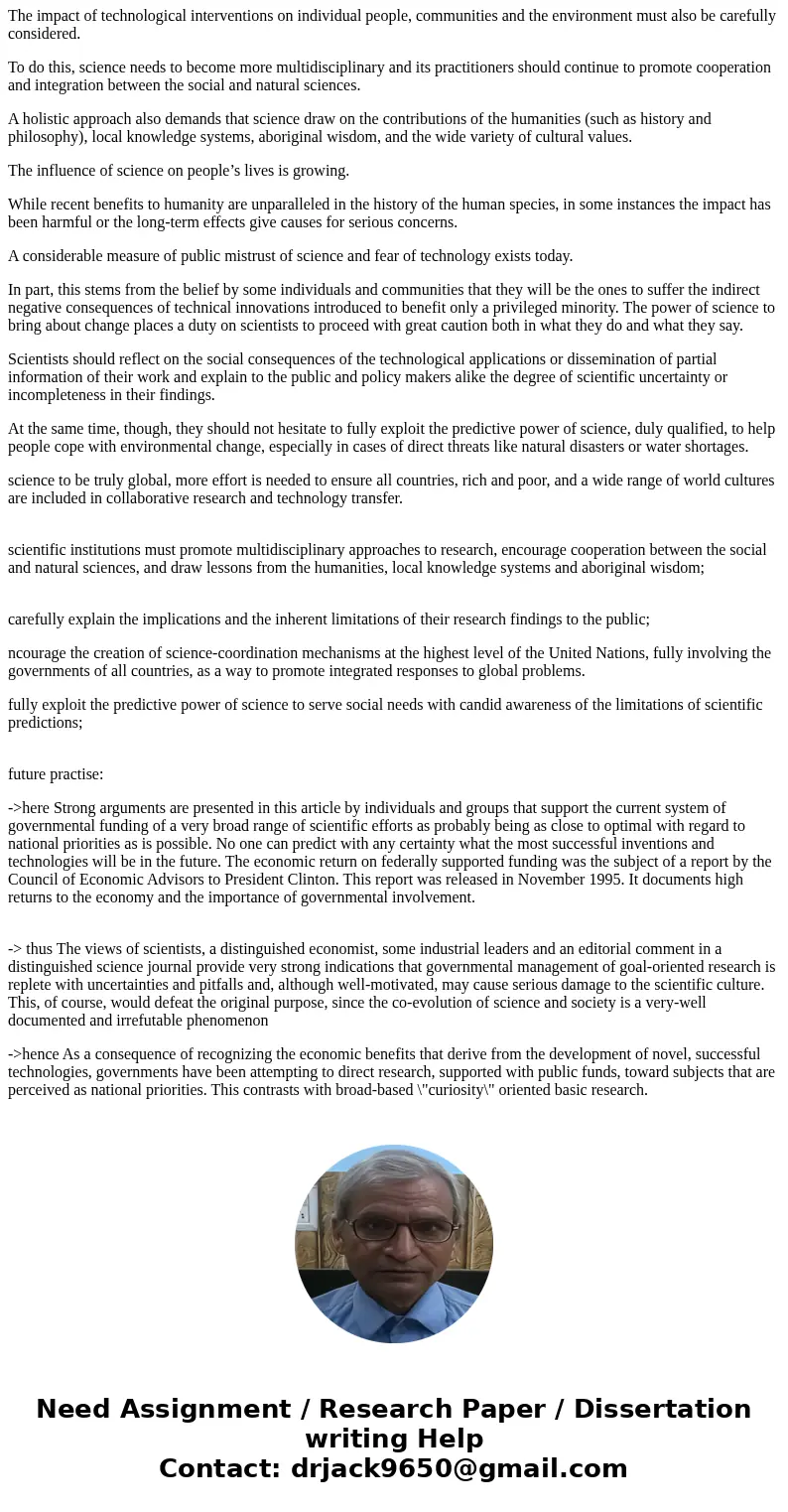Do you or do you not suspect that there is emerging a good e
Do you, or do you not, suspect that there is emerging a ‘good’ explanation of the conduct of science and technology, presently, which is sufficient to suggest a possible design to the future practice of scientific and technological knowledge discovery?
Solution
yes i do suspect that there is emerging a ‘good’ explanation of the conduct of science and technology,
let me tell you something first ,
firstly Scientific findings must also be applied at the right scales.
The impact of technological interventions on individual people, communities and the environment must also be carefully considered.
To do this, science needs to become more multidisciplinary and its practitioners should continue to promote cooperation and integration between the social and natural sciences.
A holistic approach also demands that science draw on the contributions of the humanities (such as history and philosophy), local knowledge systems, aboriginal wisdom, and the wide variety of cultural values.
The influence of science on people’s lives is growing.
While recent benefits to humanity are unparalleled in the history of the human species, in some instances the impact has been harmful or the long-term effects give causes for serious concerns.
A considerable measure of public mistrust of science and fear of technology exists today.
In part, this stems from the belief by some individuals and communities that they will be the ones to suffer the indirect negative consequences of technical innovations introduced to benefit only a privileged minority. The power of science to bring about change places a duty on scientists to proceed with great caution both in what they do and what they say.
Scientists should reflect on the social consequences of the technological applications or dissemination of partial information of their work and explain to the public and policy makers alike the degree of scientific uncertainty or incompleteness in their findings.
At the same time, though, they should not hesitate to fully exploit the predictive power of science, duly qualified, to help people cope with environmental change, especially in cases of direct threats like natural disasters or water shortages.
science to be truly global, more effort is needed to ensure all countries, rich and poor, and a wide range of world cultures are included in collaborative research and technology transfer.
scientific institutions must promote multidisciplinary approaches to research, encourage cooperation between the social and natural sciences, and draw lessons from the humanities, local knowledge systems and aboriginal wisdom;
carefully explain the implications and the inherent limitations of their research findings to the public;
ncourage the creation of science-coordination mechanisms at the highest level of the United Nations, fully involving the governments of all countries, as a way to promote integrated responses to global problems.
fully exploit the predictive power of science to serve social needs with candid awareness of the limitations of scientific predictions;
future practise:
->here Strong arguments are presented in this article by individuals and groups that support the current system of governmental funding of a very broad range of scientific efforts as probably being as close to optimal with regard to national priorities as is possible. No one can predict with any certainty what the most successful inventions and technologies will be in the future. The economic return on federally supported funding was the subject of a report by the Council of Economic Advisors to President Clinton. This report was released in November 1995. It documents high returns to the economy and the importance of governmental involvement.
-> thus The views of scientists, a distinguished economist, some industrial leaders and an editorial comment in a distinguished science journal provide very strong indications that governmental management of goal-oriented research is replete with uncertainties and pitfalls and, although well-motivated, may cause serious damage to the scientific culture. This, of course, would defeat the original purpose, since the co-evolution of science and society is a very-well documented and irrefutable phenomenon
->hence As a consequence of recognizing the economic benefits that derive from the development of novel, successful technologies, governments have been attempting to direct research, supported with public funds, toward subjects that are perceived as national priorities. This contrasts with broad-based \"curiosity\" oriented basic research.


 Homework Sourse
Homework Sourse